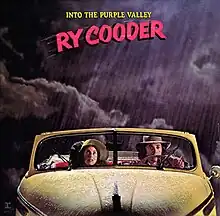| Into the Purple Valley | ||||
|---|---|---|---|---|
 | ||||
| Studio album by | ||||
| Released | January 1972 | |||
| Recorded | 1971 | |||
| Genre | Country folk[1] | |||
| Length | 37:06 | |||
| Label | Reprise[2] | |||
| Producer | Jim Dickinson, Lenny Waronker[3] | |||
| Ry Cooder chronology | ||||
| ||||
| Review scores | |
|---|---|
| Source | Rating |
| AllMusic | |
| Christgau's Record Guide | B+[5] |
| The Encyclopedia of Popular Music | |
| MusicHound Rock: The Essential Album Guide | |
| The Rolling Stone Album Guide | |
Into the Purple Valley is the second studio album by roots rock musician Ry Cooder, released in 1972.[7][8]
The album's front cover is listed at number 12 on Rolling Stone's 100 Greatest Album Covers.[9] It shows Cooder and his then wife, Susan Titelman, in a Buick convertible at the Warner Bros. film lot in Burbank, California.
Critical reception
Record Collector wrote that the album "reached deep into tradition, unearthing neglected treasures from America’s past and reshaping them for the post-Woodstock generation."[10]
Track listing
Side One
- "How Can You Keep On Moving (Unless You Migrate Too)" (Agnes "Sis" Cunningham) – 2:25
- "Billy the Kid" (Traditional; arranged by Ry Cooder) – 3:45
- "Money Honey" (Jesse Stone) – 3:28
- "FDR in Trinidad" (Fitz McLean) – 3:01
- "Teardrops Will Fall" (Gerry "Dickey Doo" Granahan, Marion Smith) – 3:03
- "Denomination Blues" (George Washington Phillips) – 3:58
Side Two
- "On a Monday" (Lead Belly) – 2:52
- "Hey Porter" (Johnny Cash) – 4:34
- "Great Dream from Heaven" (instrumental) (Joseph Spence) – 1:53
- "Taxes on the Farmer Feeds Us All" (Traditional; arranged by Ry Cooder) – 3:52
- "Vigilante Man" (Woody Guthrie) – 4:15
(Note: "Taxes on the Farmer Feeds Us All" was actually composed by Fiddlin' John Carson.)
Personnel
- Ry Cooder – guitars, mandolin, vocals
- Van Dyke Parks – keyboards
- Gloria Jones – vocals
- Claudia Lennear – vocals
- George Bohanon – horns
- John Craviotto – drums
- Joe Lane Davis – horns
- Jim Dickinson – piano
- Chris Ethridge – bass
- Milt Holland – percussion
- Jerry Jumonville – saxophone
- Fritz Richmond – washtub bass
- Donna Washburn – vocals
- Donna Weiss – vocals
- Ike Williams – horns
- Technical
- Mike Salisbury - cover design
- Marty Evans - cover photography
Billboard charts
| Chart | Peak |
|---|---|
| Pop albums | 113[11] |
References
- ↑ Larkin, Colin (1999). All-Time Top 1000 Albums. Virgin Books. p. 162. ISBN 0-7535-0354-9. Archived from the original on October 8, 2021.
- 1 2 Larkin, Colin (2006). The Encyclopedia of Popular Music. Vol. 2. MUZE. pp. 527–528.
- 1 2 MusicHound Rock: The Essential Album Guide. Visible Ink Press. 1999. p. 267.
- ↑ "AllMusic Review by Bob Gottlieb". AllMusic. Retrieved 29 March 2021.
- ↑ Christgau, Robert (1981). "Consumer Guide '70s: C". Christgau's Record Guide: Rock Albums of the Seventies. Ticknor & Fields. ISBN 089919026X. Retrieved February 23, 2019 – via robertchristgau.com.
- ↑ The Rolling Stone Album Guide. Random House. 1992. pp. 158–159.
- ↑ "Artist Biography by Steve Huey". AllMusic. Retrieved 29 March 2021.
- ↑ The Rough Guide to Rock (2nd ed.). Rough Guides Ltd. 1999. p. 211.
- ↑ "Rolling Stone's 100 Greatest Album Covers by 2tec". Discogs Lists. 1991-11-14. Retrieved 2023-02-16.
- ↑ "COODER BEEN A CONTENDER". Record Collector. Retrieved 29 March 2021.
- ↑ "Chart History Ry Cooder". Billboard. Retrieved 29 March 2021.
This article is issued from Wikipedia. The text is licensed under Creative Commons - Attribution - Sharealike. Additional terms may apply for the media files.